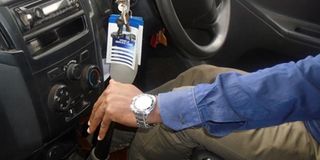Practices that could shorten the lifespan of your car

Changing gears before coming to a complete stop can shorten the lifespan of your car. Photo by Isaac Wafula
What you need to know:
- According to motorist.sg, an online website that educates drivers on bad driving practices that shorten car lifespans, “if you are driving an automatic car, always ensure that you come to a complete stop before shifting to “D” or “R” and vice versa.”
When it comes to the lifespan of your car, driving practices know no car brand. Whether it is German, Japan, British, American or French made, they are all likely to experience the same mechanical effect.
As a driver, there are certain driving practices that have an effect on your car. Until you get to learn of them probably from your mechanic, it is when you choose to drop them for the better.
Hitting potholes and humps
Edgar Kaweesa, a mechanic in Wandegeya explains that when you hit humps or potholes without reducing the car speed, it does not only weaken shock absorbers but it also affects the car’s wheel alignment, while the steering wheel he says is also not spared.
“When you hit potholes or humps deliberately without reducing speed, the steering wheel shakes and with time, it gets out of its normal position,” Kaweesa says.
Instant braking
While instant braking is caused by a number of things, Kaweesa says it also makes the car tyres wear out easily by dissolving the treads, hence requiring you to buy others within a short time than expected.
Ignoring warning or dashboard lights
Paul Kaganzi, a mechanic at Duke Car Technology explains that ignoring warning lights and unusual sounds and performance also shortens your car’s lifespan. He says they are designed to alert you of critical conditions that need your attention.
“Red lights for the engine oil, charging system, brake system and cooling system require stopping for immediate attention. Amber lights like those for the check engine allow you time to go to the workshop. Noises too should not be ignored because they could be a result of broken suspension or steering components which can lead to more breakdown or accidents,” Kaganzi says.
Driving on a low fuel tank
Driving with your fuel tank almost empty, which is in most cases looked at as a money saving technique, Kaganzi says can lead to costly fuel system damage. This, he notes is in modern cars that have their fuel pumps in the fuel tank where they are cooled by the fuel. Driving with nearly empty fuel tanks leads to overheating of the fuel pumps.
Revving your engine
He adds that revving the car engine during cold start can lead to wear and tear. “When you start your engine, it takes a few seconds for the oil pressure to build up and provide lubrication and cooling to all moving components in the engine. Revving an engine during cold start gradually causes damage or premature wear of vital engine components,” he explains.
Stepping on peddles unnecessarily
Kaganzi says that driving vehicles with manual transmissions while resting your left foot on the clutch, and your hand on the gear stick shift eventually causes premature wear of the clutch and gearbox synchronisers or shifting linkages.
Changing gears before coming to a complete stop
According to motorist.sg, an online website that educates drivers on bad driving practices that shorten car lifespans, “if you are driving an automatic car, always ensure that you come to a complete stop before shifting to “D” or “R” and vice versa.” The site says this means you are using this set of gears to work as your brakes which can damage your transmission and drive shafts.




